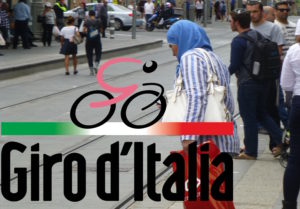
Refusing to cancel, organizers said the Giro will still start in Jerusalem and include two additional stages in Israel, but “political sensitivities” will be taken into account and its route will not go through land international law considers “occupied.”
• For the very first time in over 100 years, a portion of the sport’s Grand Tours will take place outside of Europe.
By The Associated Press and Israel Hayom Staff
When the world’s cycling elite converge on Israel next year for the storied Giro d’Italia race, they will grapple with the rugged hills of Jerusalem, speed by the shimmering Mediterranean Sea and huff their way through the dry southern Negev Desert.

The peloton in stage 7 of the 2012 Giro d’Italia. – Photo/ Wikimedia\Alefederico – Stage 7th Rocca di Cambio
But one place the riders will skip is the crown jewel of the local tourism industry, Jerusalem’s ancient Old City.
Under a longstanding tradition, the annual multi-stage race has had some starts and stages take place outside Italy. In a public relations coup for Israel, the 2018 event will be the first time the race takes place outside Europe. The Giro is to start in Jerusalem and include two additional stages in Israel.
Race organizers said the route will not go through any land considered “occupied” by the international community. That means the course will circumvent the West Bank and east Jerusalem, territories Israel seized in the 1967 Six-Day War.

Race comes to Jerusalem – Photo: IsraelandStuff/PP plus Giro logo
Race director Mauro Vegni said he was aware of the political sensitivities and had drawn up the course with the “guidance” of the Italian Foreign Ministry.
“The reality is that we want it to be a sports event and stay away from any political discussion,” Vegni told The Associated Press.
Avoiding politics, however, is difficult when dealing with Jerusalem. Israel considers east Jerusalem an inseparable part of its capital, while the Palestinians claim the area as their capital. The conflicting and emotional claims to east Jerusalem, home to the city’s most sensitive holy sites, lie at the heart of the Israeli-Palestinian conflict and often complicate what might be routine events in other locales.
In the case of the Giro, the opening stage in Jerusalem will carefully avoid the city’s invisible pre-1967 boundaries.
Riders will be able to glimpse the ancient walls of the Old City, but they will not enter it or any Palestinian neighborhoods. Other stages are planned along the Mediterranean coast and in the Red Sea resort of Eilat. The Italian Foreign Ministry confirmed it had helped Italian race organizers “get a better understanding of the broader political context” and make sure the “routes are inside the pre-1967 borders.”
The Giro is one of cycling’s prestigious Grand Tour races, along with the Tour de France and the Spanish Vuelta. The race in Israel will mark the first time that any Grand Tour event is held outside Europe. It is an achievement for Giro organizer RCS Sport to go beyond the continent ahead of rival ASO, which organizes the Tour and the Vuelta. Giro organizers declined to say how much their Israeli partners had paid to bring the race to Israel.
Israeli leaders and local race officials said they are thrilled to host the Giro, labeling it as the biggest and most prestigious sporting event ever held in Israel. They expect tens of thousands of tourists and cycling enthusiasts.
“We understand that not everyone agrees with us,” said Public Security Minister Gilad Erdan, whose ministry oversees the country’s efforts to counter an international pro-Palestinian boycott movement of the Jewish state.
The Giro coming to Israel “is a huge achievement in and of itself that strengthens Israel’s legitimacy,” he said.
The Israeli Sports Ministry called the race a symbol of “peace and unity.” The ministry said the Giro would promote Israel’s history, heritage, “magical views” and holy sites.
That does not mean race organizers can just coast to the finish line. The Palestinians and their allies in the boycott movement have objected to promotional materials on the Giro’s social media that include photos and videos of the Old City of Jerusalem.
A photo on the Giro’s Twitter account shows the Spanish cycling great Alberto Contador with Jerusalem Mayor Nir Barkat in front of the Old City, and a video on Facebook shows footage of the Western Wall and other sites inside the Old City.
Palestinian Ambassador to Rome May Kaileh said her embassy is putting pressure on the race to remove the photos.
Palestinian Sports Minister Jibril Rajoub called the photographs an “issue of misunderstanding” and said he hopes they will be removed.
“The most important thing for us, the race is not entering the 1967 boundaries, including east Jerusalem,” he said.
Omar Barghouti, Palestinian co-founder of the anti-Israel boycott movement, called on the Giro to cancel the Israel stages altogether and move the race elsewhere.
RELATED:
- Trials & Tribulations of a Serious BDS Supporter
- The 2018 Giro d’Italia cycling race opens with three stages in Israel
- A List of Products & Services To Properly Boycott Israel
Promotional material that “deceptively” portrays east Jerusalem as part of Israel, and working with an Israeli partner that does business in settlements in “illegally occupied territory” amount to “shameful complicity” in Israeli rights violations, he said.
Barghouti also promised pro-Palestinian demonstrations if the race takes place in Israel.
“Civil society organizations in Palestine, Italy and throughout Europe are mobilizing to convince participating teams, sponsors, and cycling federations to pressure Giro d’Italia to relocate the race,” he said. “Giro d’Italia can expect nonviolent, lively protests if it insists on whitewashing Israel’s occupation and apartheid.”
Vegni, the Giro director, rejected the criticism.
“I hope that it’s treated as a sports event. And I hope it’s treated as a sports event by the Palestinians also,” he said.
View original Israel Hayom publication at:
http://www.israelhayom.com/2017/11/05/next-year-in-jerusalem-grand-tour-cyclists-face-political-hurdles/






 Israeli New Shekel Exchange Rate
Israeli New Shekel Exchange Rate